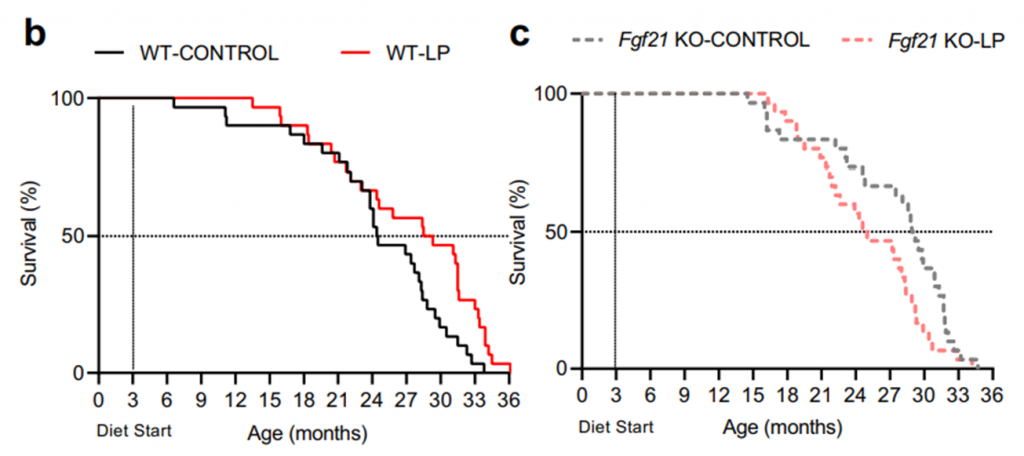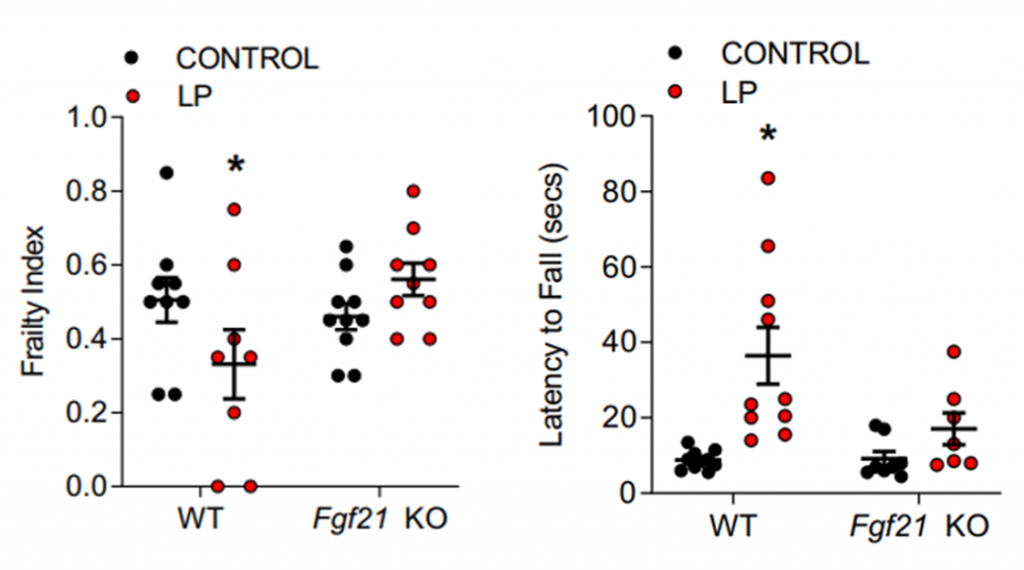Key Points:
- Mice fed a low protein (LP) diet exhibit increased lifespan, reduced frailty, and improved metabolic function.
- Mice lacking the Fgf21 gene don’t acquire the benefits of an LP diet and instead display shorter lifespans, more frailty, and reduced metabolic function.
Dietary intervention may be one of the most powerful tools available for increasing lifespan. Previous animal studies have confirmed that diets involving caloric restriction and fasting contribute to improved cognition, better muscle function, and increased lifespan. Additionally, low-protein diets have also been shown to extend lifespan as well as enhance metabolic function in rodents. Ongoing research continues to explore the mechanisms that facilitate the anti-aging effects of these diets, particularly low-protein diets, and new findings have shed light on the health-boosting effects of a liver-derived hormone called Fgf21.
Published in the journal Nature Communications, Hill and colleagues from the Pennington Biomedical Research Center in Louisiana find that Fgf21 is essential for adopting the health benefits of a protein-restricted diet. Results showed that feeding mice an LP diet led to increased lifespan, reduced frailty, and improved metabolic function. Conversely, mice lacking Fgf21 displayed shorter lifespans, more frailty, and reduced metabolic function. Together, the study’s findings suggest that Fgf21 is vital for coordinating the pro-longevity effects of an LP diet.
“We previously showed that FGF21 acts in the brain to improve metabolic health in young mice fed a low-protein diet. These new data extend this work by demonstrating that FGF21 also improves metabolic health and extends lifespan. Collectively, these data provide clear evidence that FGF21 is the first known hormone that coordinates feeding behavior and metabolic health to improve lifespan during protein restriction,” states lead author Dr. Hill. in a press release.
Prolongevity Effects of Low Protein Diet Require Ffg21
To evaluate whether Fgf21 is needed to promote increased lifespan through an LP diet, Hill and colleagues placed three-month-old WT (wild-type: mice with Fgf21)and Fgf21 KO (knockout: mice without Fgf21) mice on either a control (CON) or LP diet for the full duration of their natural lives. As expected, WT mice fed an LP diet lived the longest (~36 months). However, the LP diet reduced the lifespans of Fgf21 KO mice, indicating that Fgf21 must be present to harness the effects of an LP diet.
Notably, investigators also found strong connections between the experimental groups’ lifespans and reductions in body weight (indicative of reduced muscle mass), which can serve as an indicator of reduced physical function upon aging. While WT mice fed a LP diet (WT-LP) experienced weight loss at 22 months of age, Fgf21 KO mice fed a LP diet (KO-LP) started losing weight between 15-18 months of age, potentially indicating that the absence of Ffg21 contributes to earlier onset reductions in muscle mass. These initial findings suggest that Fgf21 is needed for the pro-longevity effects of a protein-restricted diet.

Low Protein Diet Reduces Frailty and Protects Against Age-Related Functional Decline
Next, Hill and colleagues conducted an array of tests to compile a frailty score for each experimental group at 22 months of age. Results showed that frailty markers – alopecia (hair loss), coat condition, distended abdomen, and kyphosis (curving of the spine) – were lower in WT-LP mice and significantly higher in Fg21 KO-LP mice, suggesting that the Fg21 gene has a strong influence on how a low protein diet affects frailty.
Investigators also wanted to see how the presence or absence of Fgf21 affected physical function in protein-restricted mice upon aging. First, researchers evaluated physical performance and coordination through a rotor rod test, placing mice on a rotating rod and recording the amount of time it took for them to fall. The data showed that WT-LP mice displayed the most coordination, as evidenced by the increased time on the rod. Conversely, these physical-boosting effects could not be seen in Fgf21 KO-LP mice, displaying the lowest latency times. Taken together, these results suggest that an LP diet in the presence of Fgf21 protects against age-related functional decline and frailty.

Protein Restriction in the Presence of Ffg21 Boosts Metabolic Function
Metabolic decline is inevitable with aging, and it can affect the way our body utilizes glucose, our main source of energy. Glucose tolerance refers to our body’s ability to handle glucose after a meal, and glucose tolerance tests can be utilized to screen for age-related diseases like type-2 diabetes. Hill and colleagues analyzed glucose tolerance in all experimental groups at 10 and 18 months of age and found that WT-LP mice had improved glucose tolerance while Fgf21 KO-LP mice had weaker glucose tolerance. Investigators also looked at insulin sensitivity, an indicator of how easily our cells use insulin to harness glucose energy. Similar to the results of the glucose tolerance test, WT-LP mice demonstrated increased insulin sensitivity while Fgf21 KO-LP mice had reduced insulin sensitivity, indicating that the absence of Fgf21 abolishes the metabolic health benefits of an LP diet. Collectively, the findings show that an LP diet boosts metabolic function in the presence of Fgf21.
Is a Low-Protein Diet a Good Idea?
You might be wondering whether an LP diet is right for you. If you’re trying to pack on loads of muscle, an LP diet might not be right for you. However, if you’re someone with a compromised liver or kidney, previous studies have shown that protein-restricted diets are quite effective at limiting the stress put on our livers and kidneys. Notably, certain protein sources like red meat, which contain high amounts of methionine, have been tied to age-related diseases like cardiovascular disease. With this in mind, an LP diet may be sufficient to mitigate the risk of developing certain age-related diseases. More research is needed to uncover the full effects of an LP diet, but the findings from this study may help pinpoint new molecular pathways that can elucidate the mechanisms underlying protein-restricted diets.
“This groundbreaking research has implications for extending the health and lifespan of people. If scientists can better understand how diets and nutritional hormones like FGF21 act to extend lifespan, these discoveries could offset many of the health issues that occur in middle age and later,” concludes Dr. John Kirwan, Pennington Biomedical Executive Director.
